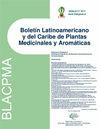Knowledge and use of medicinal plants in Calpan, Puebla, Mexico: The perception of various social sectors
IF 0.7
4区 医学
Q4 INTEGRATIVE & COMPLEMENTARY MEDICINE
Boletin Latinoamericano y del Caribe de Plantas Medicinales y Aromaticas
Pub Date : 2023-09-30
DOI:10.37360/blacpma.23.22.5.49
引用次数: 1
Abstract
Medicinal plants (HMS) have been part of everyday life in Mexico, despite being popular, little has been documented about their knowledge and use. A diagnosis was made to know the perception of the general public, housewives, doctors, teachers and people dedicated to herbalism about medicinal plants (HMS). The instruments of the poll (100), the survey (130), the census (37) and the interview (6) were used in the sectors of the population mentioned above. Descriptive statistics and measures of central tendency were used. It is a transgenerational knowledge, transmitted verbally and is part of everyday life. Its use is through infusions (tea) fordiseases considered mild. This knowledge has been relegated to the elderly and people with less purchasing power. However, 100% of the surveyed population knows and/or has used HMS. As empirical knowledge becomes scientific, it will be possible to know its effects on human health, therefore, it is important to carry out experimental studies on the biological effects of plants. In this way, its use could be further expanded through appropriate public policies.墨西哥普埃布拉卡尔潘药用植物的知识和使用:不同社会部门的看法
药用植物(HMS)已经成为墨西哥日常生活的一部分,尽管很受欢迎,但关于它们的知识和使用的文献很少。进行诊断是为了了解公众、家庭主妇、医生、教师和致力于草药学的人对药用植物的看法。在上述人口部门使用了民意调查(100人)、调查(130人)、人口普查(37人)和访谈(6人)等手段。采用描述性统计和集中趋势测量。它是一种跨代知识,通过口头传播,是日常生活的一部分。它的用途是通过冲泡(茶)来治疗被认为是轻微的疾病。只有老年人和购买力较弱的人才知道这一点。然而,100%的被调查者知道和/或使用过HMS。随着经验知识的科学化,将有可能了解其对人类健康的影响,因此,对植物的生物效应进行实验研究是很重要的。这样,就可以通过适当的公共政策进一步扩大其使用。
本文章由计算机程序翻译,如有差异,请以英文原文为准。
求助全文
约1分钟内获得全文
求助全文
来源期刊

Boletin Latinoamericano y del Caribe de Plantas Medicinales y Aromaticas
PHARMACOLOGY & PHARMACY-
CiteScore
1.30
自引率
14.30%
发文量
49
审稿时长
6-12 weeks
期刊介绍:
The Boletín Latinoamericano y del Caribe de Plantas Medicinales y Aromáticas (BLACPMA), [Latin American and Caribbean Bulletin of Medicinal and Aromatic Plants]; currently edited by the publishing house MS-Editions, is a bi-monthly international publication that publishes original peerreviewed research in the field of medicinal and aromatic plants, with nearly 20 years of experience. BLACPMA is a scientific journal that publishes two types of articles: Reviews (only in English) and Original Articles (Spanish or English), its main lines of action being agronomy, anthropology and ethnobotany, industrial applications, botany, quality and standardization, ecology and biodiversity, pharmacology, phytochemistry, pharmacognosy, regulatory and legislative aspects. While all areas of medicinal plants are welcome and the experimental approaches used can be broad and interdisciplinary; other areas of research that are not mentioned depend on the Editorial Committee for their acceptance.
 求助内容:
求助内容: 应助结果提醒方式:
应助结果提醒方式:


